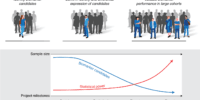Exploring The Connection Between Cancer And Inflammation
Cancer is a complex and multifaceted disease that poses a significant global health challenge.
In recent years, there has been growing interest in exploring the connection between cancer and inflammation.
Inflammation is the body’s natural response to injury or infection, characterized by redness, swelling, pain, and heat.
While acute inflammation plays a crucial role in tissue repair and healing, chronic inflammation can have detrimental effects on the body.
Emerging research suggests that chronic inflammation may contribute to the development and progression of various types of cancer.
Understanding the mechanisms underlying this link between cancer and inflammation is crucial for developing new strategies for cancer prevention, diagnosis, and treatment.
This article provides an overview of the role of inflammation in cancer development, explores inflammatory pathways in tumor growth, discusses chronic inflammation as a risk factor for cancer, examines inflammatory markers for cancer diagnosis, delves into targeting inflammation for cancer treatment, highlights the importance of an anti-inflammatory diet for cancer prevention, discusses lifestyle changes to reduce inflammation and cancer risk, and offers future directions for research in this field.
Key Takeaways
- Chronic inflammation is a significant risk factor for cancer development.
- Inflammatory markers, such as CRP, IL-6, and TNF-α, are elevated in individuals with cancer and indicate poor prognosis and reduced survival rates.
- Targeting inflammation through NSAIDs or specific molecule inhibitors shows promise for cancer treatment.
- Lifestyle changes, such as regular physical activity and stress management, can lower inflammation levels and decrease cancer risk.
The Role of Inflammation in Cancer Development
The role of inflammation in cancer development is a topic that has garnered significant attention and research within the scientific community. Inflammation is a natural response of the immune system to injury or infection, characterized by increased blood flow, swelling, and production of inflammatory mediators.
However, chronic inflammation can promote tumor initiation, progression, and metastasis. Various mechanisms contribute to this connection between inflammation and cancer. Inflammatory cells release cytokines and growth factors that create an environment conducive to tumor growth.
Additionally, inflammatory responses can cause DNA damage and genomic instability, leading to the accumulation of genetic mutations associated with cancer development. Furthermore, chronic inflammation can suppress immune surveillance mechanisms that normally identify and eliminate cancerous cells.
Understanding these intricate interactions between inflammation and cancer may provide insights for developing preventive strategies or targeted therapies for cancer treatment.
Understanding the Inflammatory Pathways in Tumor Growth
Understanding the inflammatory pathways involved in tumor growth is crucial for developing targeted therapies. Inflammation plays a complex role in cancer, either promoting or inhibiting tumor development depending on various factors.
The primary inflammatory pathway implicated in tumor growth is the NF-κB pathway, which regulates the expression of genes involved in inflammation, cell survival, and proliferation. Activation of this pathway leads to the production of pro-inflammatory cytokines and chemokines that create a favorable microenvironment for tumor progression.
Additionally, other signaling pathways such as STAT3 and MAPK have also been associated with inflammation-induced tumor growth. Targeting these pathways has shown promise in preclinical models and clinical trials by suppressing inflammatory responses and inhibiting tumor growth.
Further understanding of the intricate crosstalk between inflammation and cancer will aid in the development of more effective therapeutic strategies against cancer.
Chronic Inflammation as a Risk Factor for Cancer
Chronic inflammation has been identified as a significant risk factor for the development of various types of cancer, eliciting concern and highlighting the need for further investigation. Inflammation is a complex biological response that occurs in response to infection or tissue damage, characterized by an influx of immune cells and release of inflammatory mediators.
However, when inflammation becomes chronic and persists over an extended period, it can contribute to the initiation, promotion, and progression of cancer. Chronic inflammation leads to the production of reactive oxygen species (ROS) and DNA damage, which can result in genetic mutations and genomic instability.
Additionally, inflammatory cells release cytokines that promote cell proliferation and angiogenesis while suppressing immune surveillance against tumor cells. Furthermore, chronic inflammation creates a microenvironment that favors tumor growth by promoting tissue remodeling and creating conditions favorable for tumor invasion and metastasis.
Therefore, understanding the link between chronic inflammation and cancer is crucial for developing effective preventive strategies and therapeutic interventions.
Inflammatory Markers and Cancer Diagnosis
Evidence suggests a potential correlation between inflammatory markers and the diagnosis of malignancies. Inflammatory markers, such as C-reactive protein (CRP), interleukin-6 (IL-6), and tumor necrosis factor-alpha (TNF-α), have been found to be elevated in individuals with cancer. These markers are released by immune cells in response to inflammation, and their levels can be measured through blood tests. Elevated levels of CRP, IL-6, and TNF-α have been associated with an increased risk of various cancers, including lung, colorectal, breast, and pancreatic cancers.
Additionally, studies have shown that high levels of these inflammatory markers may indicate a poor prognosis and reduced survival rates in cancer patients. However, further research is needed to fully understand the relationship between inflammatory markers and cancer diagnosis as well as their potential use as diagnostic tools or therapeutic targets in oncology.
Targeting Inflammation for Cancer Treatment
Targeted modulation of inflammatory processes has emerged as a promising therapeutic approach in the realm of cancer treatment. Inflammation plays a crucial role in tumor development and progression by promoting angiogenesis, immune evasion, and metastasis. Therefore, suppressing inflammation can potentially prevent or delay the onset of cancer and improve patient outcomes.
Several strategies have been explored to target inflammation for cancer treatment. One approach involves using nonsteroidal anti-inflammatory drugs (NSAIDs) to inhibit cyclooxygenase enzymes and reduce the production of pro-inflammatory mediators such as prostaglandins.
Another strategy is to target specific molecules involved in inflammatory pathways, such as cytokines or chemokine receptors, through monoclonal antibodies or small molecule inhibitors.
Additionally, immunotherapies that modulate the immune system’s response to tumors have shown promise in treating certain cancers associated with chronic inflammation.
Overall, targeting inflammation holds great potential for developing innovative treatments for cancer patients.
Anti-inflammatory Diet and Cancer Prevention
In the previous subtopic, we discussed targeting inflammation as a potential approach for cancer treatment. Building on this, the current subtopic explores the role of an anti-inflammatory diet in cancer prevention.
Mounting evidence suggests that chronic inflammation contributes to the development and progression of various types of cancer. Therefore, adopting an anti-inflammatory diet rich in fruits, vegetables, whole grains, and healthy fats may help reduce the risk of developing cancer. Such a diet emphasizes foods with anti-inflammatory properties, including antioxidants and phytochemicals that can counteract inflammatory processes within the body.
Additionally, limiting or avoiding pro-inflammatory foods such as processed meats, sugary drinks, and refined carbohydrates is recommended. While further research is needed to fully understand the impact of an anti-inflammatory diet on cancer prevention, it represents a promising avenue for reducing cancer risk through dietary interventions.
Lifestyle Changes to Reduce Inflammation and Cancer Risk
Lifestyle modifications can be incorporated to effectively reduce inflammation levels and decrease the risk of cancer. These changes not only promote overall well-being but also contribute to a healthier lifestyle that is less prone to chronic diseases like cancer.
Here are three key strategies individuals can implement:
-
Regular physical activity: Engaging in regular exercise has been shown to lower inflammation markers in the body. Incorporating activities such as walking, jogging, or cycling into daily routines can help reduce the risk of developing cancer.
-
Healthy dietary choices: Consuming a diet rich in fruits, vegetables, whole grains, and lean proteins can significantly reduce inflammation levels and lower the risk of cancer. Avoiding processed foods high in sugars and unhealthy fats is crucial.
-
Stress management: Chronic stress triggers an inflammatory response in the body that may increase cancer risk. Employing stress reduction techniques like meditation, deep breathing exercises, or engaging in hobbies can effectively lower inflammation levels.
By adopting these lifestyle changes, individuals can take proactive steps towards reducing inflammation and minimizing their chances of developing cancer.
Future Directions in Cancer and Inflammation Research
Advancements in scientific research are paving the way for new insights and potential breakthroughs in understanding the intricate relationship between cancer and inflammation. As our knowledge of the underlying mechanisms deepens, future directions in cancer and inflammation research aim to unravel their complex interplay and identify promising therapeutic targets.
One area of focus is the identification of specific molecules involved in inflammatory processes that contribute to tumor development and progression. Additionally, researchers are investigating novel strategies to modulate immune responses and inhibit chronic inflammation, which may have a preventive effect on cancer initiation.
Advanced imaging techniques are also being employed to better visualize inflammatory processes within tumors, providing valuable information for diagnosis, prognosis, and treatment selection. Overall, ongoing investigations into the multifaceted link between cancer and inflammation hold great promise for improved prevention strategies, early detection methods, and targeted therapies.
Frequently Asked Questions
What are the common signs and symptoms of chronic inflammation?
Common signs and symptoms of chronic inflammation include pain, swelling, redness, heat, and loss of function in the affected area. It can also manifest as fatigue, fever, headaches, muscle stiffness, and a general feeling of malaise.
Can inflammation be a symptom of cancer?
Inflammation can be a symptom of cancer. Tumor cells produce inflammatory substances that trigger an immune response, leading to chronic inflammation. This inflammation promotes tumor growth and metastasis, making it an important aspect in cancer progression.
Are there any specific inflammatory markers that are commonly associated with cancer?
Specific inflammatory markers commonly associated with cancer include C-reactive protein (CRP), interleukin-6 (IL-6), tumor necrosis factor-alpha (TNF-alpha), and prostaglandins. These markers can serve as indicators of the presence or progression of cancer.
How does chronic inflammation increase the risk of developing cancer?
Chronic inflammation can increase the risk of developing cancer by promoting DNA damage, inhibiting DNA repair mechanisms, and stimulating abnormal cell growth. This creates an environment conducive to cancer initiation and progression.
Can targeting inflammation be a viable treatment option for all types of cancer?
Targeting inflammation may not be a viable treatment option for all types of cancer. While chronic inflammation can contribute to tumor development, the complexity and heterogeneity of cancer make it unlikely that a one-size-fits-all approach will be effective.







